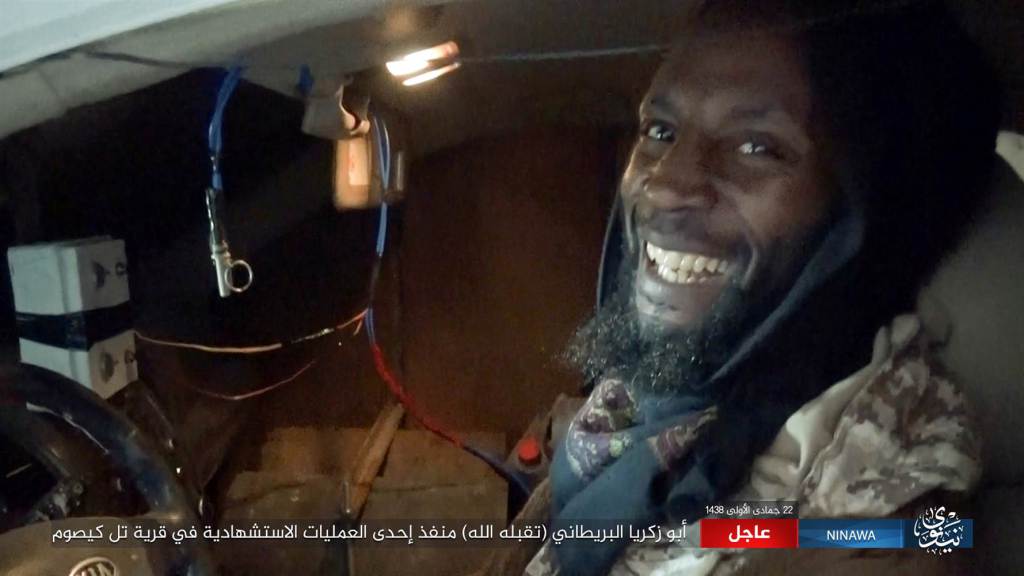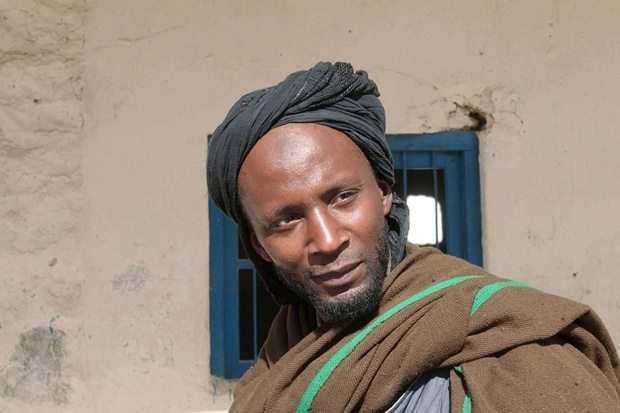After the Islamic State identified the suicide bomber that attacked an Iraqi military base outside of Mosul on Monday as a former Guantanamo Bay detainee, blame has circulated in both the US and UK. The British born man known as Abu Zakariya al-Britani, also known as Ronald Fiddler, and as Jamal al-Harith, had been transferred from Guantanamo under President George W. Bush in 2004.
In a statement released by ISIS, the group stated, “The martyrdom-seeking brother Abu Zakariya al-Britani – may Allah accept him – detonated his explosives-laden vehicle on a headquarters of the Rafidhi army and its militias in Tal Kisum village, southwest of Mosul.” According to reports from Iraq, al-Britani was one of four Islamic State fighters that carried out suicide vehicle-born improvised explosive device styled attacks on the base that day.

Born as Ronald Fiddler, al-Britani had converted to Islam in 1994. In October 2001, he travelled to Quetta, Pakistan, on what he claimed was a religious holiday, before the Taliban locked him up, accusing him of being a British spy. He was found in a Taliban jail by US Special Forces on the Afghan side of the Waziristan border region, arrested, and transferred to the US Navy detention center at Guantanamo Bay.
Al-Britani was released from US military custody to British custody in 2004, after lengthy lobbying by members of the British parliament for his release. In 2010 he was one of 16 men who were rewarded a combined US $12.4 million in compensation for their “unlawful arrest.” Reportedly, the funds were paid to avoid British Intelligence having to make public national security issues in an open court.
The news and backlash prompted a statement from former PM Tony Blair:
Tony Blair response to Jamal al-Harith story: https://t.co/DKgYeEnvASpic.twitter.com/2iPTL7AjmP
— Tony Blair Office (@tonyblairoffice) February 22, 2017
Blair’s statement reads in full:
“I would not normally respond to daily stories about events which happened during my time in office but on this occasion I will do so, given the utter hypocrisy with which this story is being covered. The Daily Mail is running a story entitled “Still Think He Wasn’t A Danger, Mr Blair? Fury at Labour government’s £1m compensation for innocent Brit”, regarding news a former Guantanamo Bay detainee launched a suicide attack on behalf of ISIS this week.
It is correct that Jamal al-Harith was released from Guantanamo Bay at the request of the British Government in 2004. This followed a massive media and Parliamentary campaign, led by the Daily Mail, the very paper that is now supposedly so outraged at his release and strongly supported by the then Conservative Opposition. The Mail headline shortly after he was released after months of their campaigning was “Freedom At Last for Guantanamo Britons”. They then quoted with approval various human rights activists saying ‘clearly by what’s happened they’re not bad guys, they are entirely innocent.’
He was not paid compensation by my Government. The compensation was agreed in 2010 by the Conservative Government.
When his release was announced in very measured terms in 2004, pointing out the risks which remained with Guantanamo detainees, the Conservative MPs reacted by strongly criticising not the release but why it had taken so long.
The fact is that this was always a very difficult situation where any Government would have to balance proper concern for civil liberties with desire to protect our security, and we were likely to be attacked whatever course we took. The reason it did take a long time for their release was precisely the anxiety over their true affiliations.
Pressed again in 2004 on the remaining British detainees at Guantanamo I told the Liaison Committee: “The difficulty for us is this: we all know that we are faced with a significant terrorist threat. Let us be clear, all of these people…were picked up in circumstances where we believe, at the very least, there are issues that need to be resolved, let us say, in respect of those individuals. Certainly from what I have seen about those individual cases, I would need to be very, very clear that there was in place in this country a sufficient infrastructure and machinery to be able to protect our own security”.
But those who demanded their release should not be allowed to get away with now telling us that it is a scandal that it happened.”
ENDS”
Reportedly, the lawyers that represented the Guantanamo Bay prisoners could face misconduct charges.
Lawyer who helped Guantanamo Bay prisoners win multi-million pound settlements could B struck-off for ‘misconduct’ https://t.co/dlxWLsOg9n
— Helen (@Hells4Heroes) February 23, 2017
The news has also prompted UK’s government to question whether funds awarded were used to fund terrorism, with Philip Davies, a Tory MP stating, “The taxpayers have been ripped off, terrorists are prospering from their appalling activities and the public are rightly disgusted by it.”
A question posed by the BBC asks, “Is it ever right to compensate terror suspects?”
Our next question concerns reports this week that a suicide bomber had received compensation for time spent in Guantanamo Bay #bbcqt pic.twitter.com/u2IZAeTjsS
— BBC Question Time (@bbcquestiontime) February 23, 2017

Al-Britani was also one of 4 plaintiffs in the 2004 U.S. lawsuit Rasul v. Rumsfeld, British detainees that alleged they had been tortured and abused, then released from Guantánamo after more than two years without charge. The case was eventually dismissed in 2009.
U.S. media has also joined the blame game, with pundits and politicians generally assessing blame against either George W. Bush or Barack Obama.
According to a report by the US Intelligence organization, Office of the Director of National Intelligence, al-Britani is one of 118 individuals that have been released from Guantanamo Bay captivity that have been involved in terror activities after their release. The intelligence agency lists 86 individuals that it considers “suspected of reengaging” in terror. According to reports, in total, a little less than one in three detainees released from US Military custody at Guantanamo are confirmed or suspected of joining terrorist operations against America.
As reported by the Long War Journal, al-Britani is not the first former Guantanamo detainee to become a suicide bomber in Iraq. In 2008, ex-Guantanamo detainee Abdullah Salih al Ajmi died in a suicide attack in Mosul, taking 13 people with him and wounding dozens more. One of the current leaders of the al-Qaeda in the Arabian Peninsula (AQAP) terror group is also former detainee Ibrahim al-Qosi.
Blame has also been apportioned to Guantanamo Bay itself.
While al-Britani’s brother, Leon Jameson, told The Times that his brother had “wasted his life,” in an interview with British television today, Shukee Begum, al-Britani’s wife claimed for the first time that her husband was radicalized a decade after his release from Guantanamo Bay by the Islamic State recruiter Raphael Hostey. Hostey was the “baby faced” British rapper who left his wife and child to join ISIS in 2013, before his death in 2016.
And the blame game continues.
LIMA CHARLIE NEWS
Lima Charlie provides global news, insight & analysis by military veterans and service members Worldwide.
For up-to-date news on the Middle East, please follow John Sjoholm on Twitter @JohnSjoholmLC





![Africa’s Elections | In Malawi, food, land, corruption dominate [Lima Charlie News]](https://limacharlienews.com/wp-content/uploads/2019/06/Malawi-election-Food-land-corruption-480x384.jpg)
![Image The Rwandan Jewel - Peacekeepers, Conflict Minerals and Lots of Foreign Aid [Lima Charlie World]](https://limacharlienews.com/wp-content/uploads/2019/03/Rwanda-Jewel-480x384.jpg)
![Image [Women's Day Warriors - Africa's queens, rebels and freedom fighters][Lima Charlie News]](https://limacharlienews.com/wp-content/uploads/2019/03/Womens-Day-Warriors-Lima-Charlie-News-480x384.jpg)
![Image Zimbabwe’s Election - Is there a path ahead? [Lima Charlie News]](https://limacharlienews.com/wp-content/uploads/2018/09/Zimbabwe’s-Election-Is-there-a-path-ahead-Lima-Charlie-News-480x384.png)
![[Silver lining for China in Zimbabwe’s violent elections][Lima Charlie News]](https://limacharlienews.com/wp-content/uploads/2018/08/Screen-Shot-2018-08-02-at-12.51.35-PM-480x384.png)

